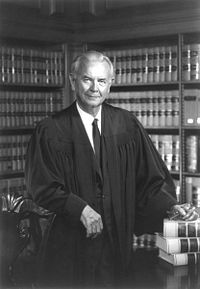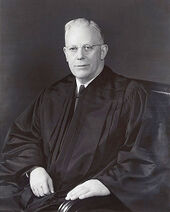Liberalism and pornography
Pornography is considered harmful, addictive, and linked to sex trafficking.[1][2]
Contents
History of legality
The United States Supreme Court when liberal California RINO Earl Warren was Chief Justice was known for its consistent liberal rulings, typically with Warren joined by Hugo Black, William O. Douglas, Abe Fortas, and William Brennan in creating a majority that would always decide a case no matter what the other four justices thought.

Memoirs v. Massachusetts
- For a more detailed treatment, see Memoirs v. Massachusetts.
In the Supreme Court ruling for Memoirs v. Massachusetts, Justices Brennan, Fortas, Brennan, Black, Douglas, and Stewart made up the majority opinion that expanded the legality of pornographic "literature", protecting them unless they had "no literary value".[4] The three dissents came from Justices Byron White, Tom Clark, and John Harlan II.

Per the conclusion of Brennan on the ruling in concurrence with Warren and Fortas:[5]
| “ | 1. Under the test in Roth v. United States, 354 U. S. 476, as elaborated in subsequent cases, each of three elements must independently be satisfied before a book can be held obscene: (a) the dominant theme of the material taken as a whole appeals to a prurient interest in sex; (b) the material is patently offensive because it affronts contemporary community standards relating to the description or representation of sexual matters, and (c) the material is utterly without redeeming social value. P. 383 U. S. 418.
2. Since a book cannot be proscribed as obscene unless found to be utterly without redeeming social value, the Supreme Judicial Court erroneously interpreted the federal constitutional standard. Pp. 383 U. S. 419-420. 3. On the premise, not assessed here, that it has the requisite prurient appeal, is patently offensive, and has only a modicum of social importance, evidence of commercial exploitation of the book for the sake of prurient appeal to the exclusion of all other values. |
” |

Justice Douglas wrote:[5]
| “ | 1. Since the First Amendment forbids censorship of expression of ideas not linked with illegal action, Fanny Hill cannot be proscribed. Pp. 383 U. S. 426; 383 U. S. 427-433.
2. Even under the prevailing view of the Roth test the book cannot be held to be obscene in view of substantial evidence showing that it has literary, historical, and social importance. P. 383 U. S. 426. 3. Since there is no power under the First Amendment to control mere expression, the manner in which a book that concededly has social worth is advertised and sold is irrelevant. P. 383 U. S. 427. 4. There is no basis in history for the view expressed in Roth that "obscene" speech is "outside" the protection of the First Amendment. Pp. 383 U. S. 428-431. 5. No interest of society justifies overriding the guarantees of free speech and press and establishing a regime of censorship. Pp. 383 U.S. 431-433. |
” |
Current statistics
According to statistics in 2018 from a pornographic site listing which states used them the most, the highest viewership per capita came from Washington, D.C.,[6] which is extremely left-wing;[7][8] following it was Illinois, Georgia, and Nevada. The lowest page views per capita was Arkansas, a very conservative state.
According to the report, the age group that accounted for the most pornography web traffic were millennials,[6] who tend to be politically more liberal than older generations.[9][10] Millennials are also significantly less religious.[11][12]
Left-wing deceit
- See: Liberal deceit
Many liberals attempt to counter the relation between pornography and the political left by claiming that conservatives supposedly consume pornography at a higher rate. These claims ignore and whitewash the fact that pornography and sexual immorality in general is contrary to conservative Christian principles and has roots in leftist ideologies that expanded during the sexual revolution.
Some sources claim that conservatives and Republican-favoring states are the most pro-pornography,[13][14][15][16] though they usually are very outdated by at least a decade.
It's furthermore important to note that three-fourths of people who identify as Christians admit to watching pornography.[17] This is a result of the general declining influence of biblical Christian values among younger generations that began since the mid-1900s, further perpetuated with liberal, anti-American Supreme Court rulings including Engel v. Vitale, which outlawed classroom prayer.[18]
See also
References
- ↑ Let’s Talk About Porn. Is It As Harmless As Society Says It Is?. Fight The New Drug. Retrieved February 15, 2021.
- ↑ Westen, John-Henry (January 28, 2015). Want to Stop Sex Trafficking? Look to America’s Porn Addiction. Huffington Post. Retrieved February 15, 2021.
- ↑ 3.0 3.1 Eisenhower's 'Mistakes'. The New York Times. Retrieved February 15, 2021.
- ↑ Memoirs v. Massachusetts 1966. encyclopedia.com. Retrieved February 15, 2021.
- ↑ 5.0 5.1 Memoirs v. Massachusetts, 383 U.S. 413 (1966). Justia. Retrieved February 15, 2021.
- ↑ 6.0 6.1 Randle, Aaron (January 31, 2018). Who watches the most porn? Not Kansas anymore. The Kansas City Star. Retrieved February 15, 2021. (Warning: Article links to inappropriate website)
- ↑ District of Columbia Results. The New York Times. Retrieved February 15, 2021.
- ↑ District of Columbia Presidential Election Results 2020. NBC News. Retrieved February 15, 2021.
- ↑ Exit Polls 2016. CNN. Retrieved February 15, 2021.
- ↑ Thompson, Derek (February 29, 2016). The Liberal Millennial Revolution. The Atlantic. Retrieved February 15, 2021.
- ↑ Wildes, Mark (June 19, 2017). Millennials and Religion: A New Perspective. Huffington Post. Retrieved February 15, 2021.
- ↑ Dox, Daniel; Thomson-DeVeaux, Amelia (December 12, 2019). Millennials Are Leaving Religion And Not Coming Back. FiveThirtyEight. Retrieved February 15, 2021.
- ↑ Toscano, Paul (July 14, 2009). Top US States For Online Pornography. CNBC. Retrieved February 15, 2021.
- ↑ Barber, Nigel (March 7, 2009). Why Conservatives Spend More on Pornography. Psychology Today. Retrieved February 15, 2021.
- ↑ Callway, Evan (February 27, 2009). Porn in the USA: Conservatives Are Biggest Consumers. ABC News. Retrieved February 15, 2021.
- ↑ Barber, Nigel (August 21, 2011). Why Conservatives Spend More on Cyber Porn. Huffington Post. Retrieved February 15, 2021.
- ↑ 15 Mind-Blowing Statistics About Pornography And The Church. Conquer Series. Retrieved February 15, 2021.
- ↑ Two references:
- Facts and Case Summary - Engel v. Vitale. United States Courts. Retrieved February 15, 2021.
- Engel v. Vitale. Britannica. Retrieved February 15, 2021.